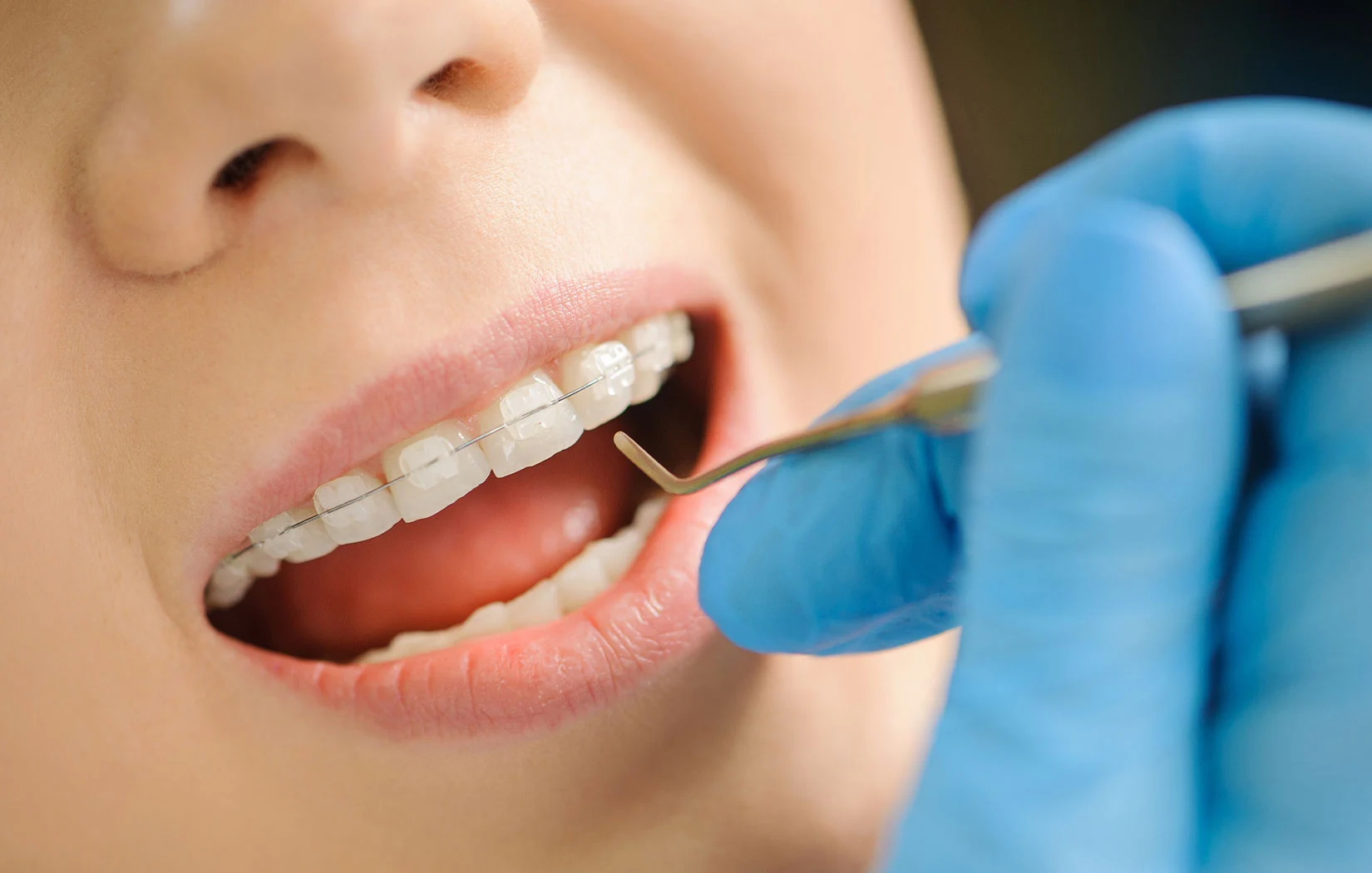Last Updated on: 10th December 2025, 06:24 am
Cavities caused by braces are common because brackets and wires trap food and bacteria, making teeth difficult to clean. Poor oral hygiene and sugary diets increase the risk of tooth decay with braces. Regular brushing, flossing, fluoride, and dentist visits will help prevent them.
Braces are one of the main treatments for correcting dental problems such as misaligned teeth, crowding, an inadequate bite, or even creating space for implants.
Many people need or will need orthodontic treatment, but a common concern is cavities with braces. In fact, cavities caused by braces are one of the most frequent side effects.
The good news is that these cavities have clear causes and can be completely prevented. Let’s take a closer look and understand why this happens and how to avoid it.
What are cavities and how do they form?
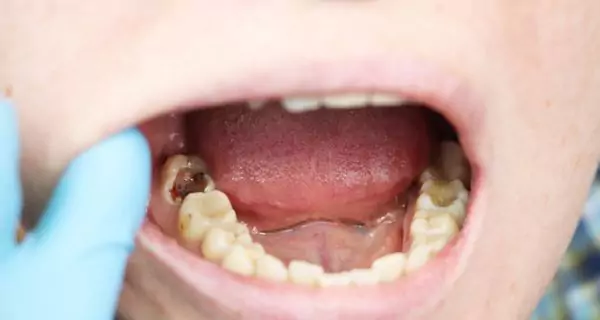
Cavities are small holes in teeth caused by acids produced by bacteria. They form in steps:
- Eating sugary foods and not cleaning teeth properly increases plaque formation.
- Plaque acid attacks enamel, causing demineralization, color changes, and holes in the teeth.
If cavities are left untreated, they can lead to:
- tooth infections
- root canal treatment
- tooth loss
- gum disease or jaw problems
Almost 90% of the population has experienced cavities at some point. For people with braces, cavities are more likely because brackets trap food and make cleaning harder. This can lead to cavities under braces if not controlled.
Can braces cause cavities?
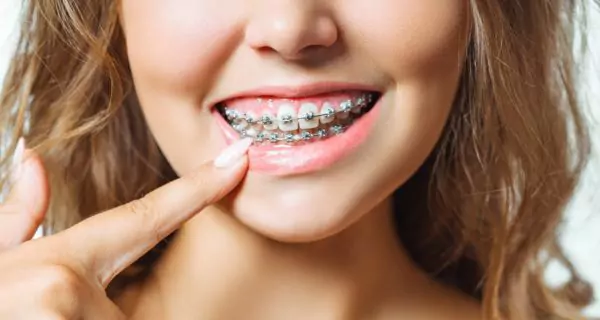
Braces do not directly cause cavities, but they make teeth harder to clean. Food and bacteria can get stuck around brackets, increasing plaque and tooth decay.
Braces can also cause enamel demineralization and gum inflammation, which makes teeth more vulnerable to decay.
However, the different therapeutic alternatives of dentistry allow the application of oral hygiene procedures and practices that may reduce this impact.
What are the symptoms of cavities caused by braces?
When you undergo orthodontic treatment, you have a greater predisposition for dental caries. Some of the signs that alert to the presence of this type of dental injury are:
- severe tooth pain
- increased sensitivity to hot, cold, or acidic foods
- holes or cracks in teeth
- pain or pressure when chewing
- stains on the teeth
Recognizing these signs early allows timely treatment and prevents severe problems.
Why must braces be placed by a specialist?
Braces should always be placed by a qualified orthodontist. Avoid “luxury brackets” or treatments by untrained people. Poor placement can cause serious issues:
- misaligned teeth after treatment
- gum damage
- severe cavities or even tooth loss
Proper diagnosis and professional care are essential for safe, effective, and long-lasting orthodontic results.
How should you clean teeth with braces?
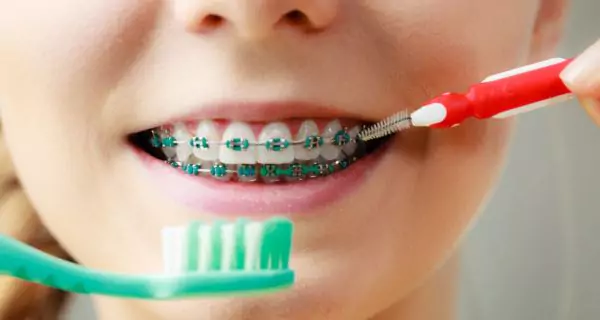
If you have braces, the most important thing is good oral hygiene. This is the best way to prevent cavities caused by braces.
Here is a step-by-step cleaning guide to maintain your teeth as healthy as possible, even while using braces:
Brush after every meal
- Use a soft-bristle toothbrush or one designed for braces to avoid damaging brackets or gums.
- Brush at a 45-degree angle to clean around wires and brackets.
- Take extra time to clean each tooth carefully.
Floss daily
- Remove food stuck between teeth to prevent tooth decay with braces.
- Use floss threaders, interdental brushes, or a water irrigator to reach areas under wires and between brackets.
Rinse with fluoride mouthwash
- Fluoride strengthens enamel and prevents cavities under braces.
- Use daily, especially after brushing and flossing.
Maintain an orthodontic hygiene kit
- Keep a small kit with a toothbrush, toothpaste, floss, and mouthwash.
- Useful for cleaning after lunch or snacks at school, work, or restaurants
It is very important to have strong oral hygiene before getting braces. Braces make cleaning teeth harder, people without good habits may struggle, increasing the risk of cavities.
What are the risks of poor treatment or hygiene?
Sadly, some people get braces in unadvised places or without proper supervision. Poor diagnosis, lack of hygiene, or improper placement can lead to:
- large cavities
- root canals or crowns
- tooth loss
This highlights the importance of good hygiene habits before and during treatment, and choosing a licensed orthodontist.
How can I maintain healthy teeth with braces?
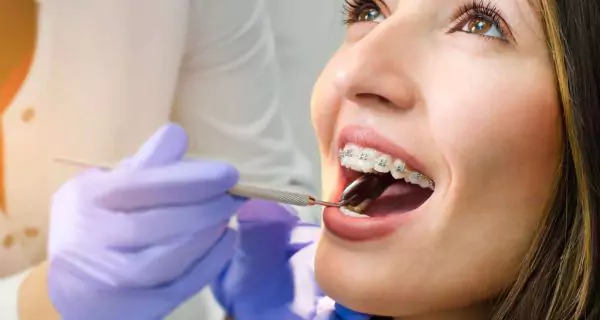
Maintaining healthy teeth with braces is more than just brushing and flossing. Diet, habits, and regular dental visits also play a key role in preventing cavities caused by braces.
Can diet affect cavities with braces?
A healthy diet reduces the risk of cavities caused by braces. Eating carefully helps keep teeth clean and braces safe:
- Cut fruit into small pieces to make chewing easier.
- Avoid sticky or hard foods like caramel, peanuts, and popcorn.
- Limit sugary foods to reduce plaque formation.
- Don’t bite pens, nails, or other hard objects; this can knock off your braces and cause injuries to teeth and gums.
Small changes in eating habits can make a big difference for your teeth during orthodontic treatment.
Why are regular dental checks important with braces?
Regular dental visits are essential to prevent cavities after braces and other oral problems. Dentists can detect early signs of decay, monitor gum health, and adjust the braces when needed.
Some benefits of regular dental checks are:
- early detection of cavities and gum problems
- professional cleaning to remove plaque around braces
- braces adjustments to ensure teeth move correctly
- avoids complex treatments later
Orthodontists usually check your teeth once a month. Skipping appointments can affect your treatment success. Consistent visits ensure teeth stay healthy during and after braces.
What other habits and daily care protect braces?
Good habits support oral health and help maintain braces in perfect condition.
Key habits for braces care include:
- Replace the toothbrush every 3 months or sooner if the bristles wear out
- Carry an orthodontic hygiene kit (toothbrush, toothpaste, floss, mouthwash)
- Avoid chewing hard or sticky objects that can damage brackets
- Use fluoride products to strengthen enamel and prevent decay
Following these habits, along with proper brushing and flossing, reduces the risk of holes in teeth from braces and ensures a healthy smile after treatment.
How are cavities treated when you have braces?
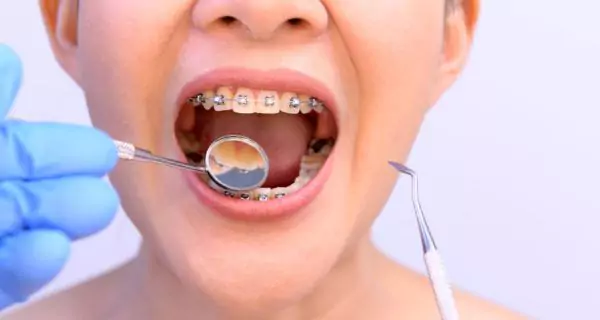
Cavities near brackets can be more difficult to treat, but treatment is possible. How your dentist treats a cavity depends on its location, size, and severity.
How are small cavities treated with braces?
For small cavities that are easy to reach:
- The dentist may numb the tooth.
- Decay is removed using a dental drill.
- The cavity is filled with a tooth-colored filling.
- Brackets and wires usually stay in place.
If there are early signs of decay, such as white spots (decalcification), your dentist may apply a fluoride varnish to remineralize the enamel and prevent the cavity from worsening.
How are difficult cavities treated with braces?
For cavities that are under brackets, hard to reach, or multiple:
- The dentist may temporarily remove the bracket or wire.
- The decay is treated with fillings or other procedures.
- Brackets and wires are reattached as soon as possible to continue orthodontic treatment.
This method ensures your treatment stays on track while effectively treating the decay.
How does fluoride help prevent cavities with braces?
Fluoride strengthens enamel and reduces the risk of holes in teeth from braces. It can be applied in several ways:
- toothpaste containing fluoride
- dental floss with fluoride
- mouthwashes or gels
- some fillings and dental cements
- Many countries add fluoride to drinking water, salt, or milk to prevent cavities.
Important note: Excess fluoride can cause dental or skeletal fluorosis. Always follow your dentist’s recommendations when using fluoride products.
Are braces the real cause of cavities?
Braces are an effective solution for misaligned teeth or bite problems, but they do not directly cause cavities.
Most tooth decay happens because of poor oral hygiene and diet. Maintaining proper brushing, flossing, fluoride use, and regular dental check-ups will prevent cavities and protect teeth during treatment.
With careful dental care, side effects of braces can be minimized, ensuring a strong, healthy smile both during and after orthodontic treatment.
Frequently Asked Questions
Do braces cause more cavities than no braces at all?
Are you more susceptible to cavities after having braces?
How do I prevent tooth decay while wearing braces?
Is it common to get cavities with braces?
Can braces damage enamel?
Voice and Search (Q&A)
Do I need a specialist for braces?
Yes, braces should always be placed by a qualified orthodontist. Incorrect placement can cause tooth decay, gum damage, or misalignment.
Why do cavities sometimes appear after braces are removed?
Cavities after braces removed usually happen if oral hygiene was poor during treatment, or if diet and care were not managed properly.
How often should I visit the dentist with braces?
Orthodontists recommend monthly visits. Regular check-ups detect cavities early, prevent gum problems, and adjust braces correctly.
Share:
References
1. Assatourians, G. (2023, April 3). Cavities Caused by Braces: 3 Other Problems from Brackets. https://cidentist.com/cavities-caused-by-braces/
2. CDC. (2024, May 15). About cavities (Tooth decay). Oral Health. https://www.cdc.gov/oral-health/about/cavities-tooth-decay.html
3. Choi, Y. Y. (2019). Relationship between orthodontic treatment and dental caries: results from a national survey. International Dental Journal, 70(1), 38–44. https://doi.org/10.1111/idj.12515
4. Mayo Clinic. (2022, May 19) Tooth Decay – Symptoms and Causes. https://www.mayoclinic.org/es-es/diseases-conditions/cavities/symptoms-causes/syc-20352892
5. Talic, N. F. (2011). Adverse effects of orthodontic treatment: A clinical perspective. The Saudi Dental Journal, 23(2), 55–59. https://doi.org/10.1016/j.sdentj.2011.01.003
-
Dr. Yeidy Carolina Mesa [Author]
DDS Yeidy Carolina Mesa Passionate Dentist | Advocate for Accessible Oral Health Education Graduating from Universidad CES in 2022, I am a dedicated general dentist with a lifelong passion for helping others and making a meaningful impact in the world. My journey into dentistry began at the age of 7, inspired by my own experience with braces and overcoming a fear of the dentist. This personal journey shaped my mission to help patients conquer their own dental anxieties and embrace a healthier,...
View all posts
-
Nayibe Cubillos M. [Medical Reviewer]
Pharmaceutical Chemestry |Pharmaceutical Process Management | Pharmaceutical Care | Pharmaceutical Services Audit | Pharmaceutical Services Process Consulting | Content Project Manager | SEO Knowledge | Content Writer | Leadership | Scrum Master
View all posts
A healthcare writer with a solid background in pharmaceutical chemistry and a thorough understanding of Colombian regulatory processes and comprehensive sector management, she has significant experience coordinating and leading multidisciplina...Recent Posts


